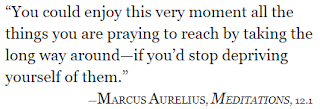210623 What I learned in my studies this morning
Death is part of life,
Wholly unpolluted by
Our understanding.
Daily Stoic:
Today's Meditation:
From A Guide to the Good Life by William B. Irvine:
Chapter 21: Stoicism Reconsidered
Daily Stoic:
There's an old story about a king's advisor. The king was preparing to go to war with a neighboring country. Taxes were levied. Men were conscripted. Horses and other animals were made ready. Equipment was created and loaded for transport. All the things necessary to invade and conquer another land.
When the advisor asked the king why he was invading the other nation, the king replied, "Once I have conquered XYZland, I will need to subjugate ABCland."
The advisor asked him what he will do after that. "Once I have taken over ABCland, I will go on to defeat DEFland."
The advisor asked, "And then what?"
"Well, then I will retire to my country estate and enjoy fine food and better entertainment with my friends."
Finally, the advisor asked the king, "And what is stopping you from doing those things now?"
--------------------------
Sometimes I get so focused on doing something, I forget what my true goal is. I become so busy with being busy, that I don't realize that I have it already within my grasp to achieve my goals.
Sometimes, my plans prevent my from achieving my aims.
From A Calendar of Wisdom by Leo Tolstoy
Chapter 21: Stoicism Reconsidered
Thought it has been neglected or given a bad rap over the past few millennia, Stoicism still has much to offer.
- Know thyself. Be aware of our responses and behaviors. Are we acting properly?
- Use your reason. Rationality can help us weather the tempests of emotion and desire that we so frequently experience. Particularly by helping us understand which things are worth our mental and spiritual energy and which are not.
- Accept preferred indifferents. If we are fortunate, and money or health or good relationships follow us through our days, accept them, but make sure you don't let them become anchors on your life or happiness.
- Choose your friends wisely. People can help us or hinder us in our path through the world. The Stoic works hard to be sociable and to perform valuable service to the community. Make sure you use your Stoic techniques to amicably handle disagreements and disappointments which may be brought about by them.
- Use negative visualization. Attachment to things in this world can cause us to be dissatisfied. Negative visualization helps us mitigate that problem and to be prepared should they be taken from us. This helps not only with people and things, but also with controlling desire.
- Know what is up to us and what is not up to us. Ease your mind of all burdens which it need not carry by eliminating those over which you have no control.
- Set internal goals. Make sure that our goals are within us and not "out there" in the world. E.g. in playing a tennis against a friend, play to do the best you can rather than to win. Striving to perform at your best is under your control. Whether or not you win depends on myriad factors you cannot influence.
- Amor fati. Love your fate. Accept that life is as it is. Reality is how it is regardless of our desires. If, instead of bemoaning what befalls us, we greet each aspect of life with equanimity and, if not cheerfulness at least with aplomb, our serenity will increase and be unshakable.



Comments
Post a Comment
Please note that I am not saying I agree or disagree with what is posted above. It is merely a recording of what I read this morning.